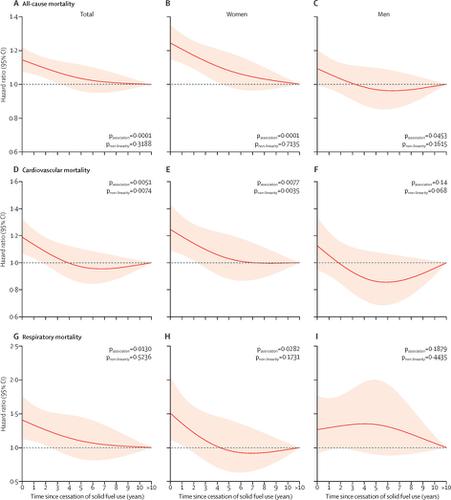The Lancet Global Health ( IF 34.3 ) Pub Date : 2020-01-20 , DOI: 10.1016/s2214-109x(19)30525-x Kuai Yu 1 , Jun Lv 2 , Gaokun Qiu 1 , Canqing Yu 2 , Yu Guo 3 , Zheng Bian 3 , Ling Yang 4 , Yiping Chen 4 , Chaolong Wang 1 , An Pan 1 , Liming Liang 5 , Frank B Hu 6 , Zhengming Chen 4 , Liming Li 2 , Tangchun Wu 1 ,

|
Background
Cooking practice has transitioned from use of solid fuels to use of clean fuels, with addition of better ventilation facilities. However, the change in mortality risk associated with such a transition remains unclear.
Methods
The China Kadoorie Biobank (CKB) Study enrolled participants (aged 30–79 years) from ten areas across China; we chose to study participants from five urban areas where transition from use of solid fuels to clean fuels for cooking was prevalent. Participants who reported regular cooking (weekly or more frequently) at baseline were categorised as persistent clean fuel users, previous solid fuel users, or persistent solid fuel users, according to self-reported fuel use histories. All-cause and cardiopulmonary mortality were identified through linkage to China's Disease Surveillance Point system and local mortality records.
Findings
Between June 24, 2004, and July 15, 2008, 226 186 participants living in five urban areas of China were enrolled in the CKB Study. Among 171 677 participants who reported cooking regularly (weekly or more frequently), 75 785 (44%) were persistent clean fuel users, 80 511 (47%) were previous solid fuel users, and 15 381 (9%) were persistent solid fuel users. During a mean of 9·8 (SD 1·7) years of follow-up, 10 831 deaths were documented, including 3819 cardiovascular deaths and 761 respiratory deaths. Compared with persistent clean fuel users, persistent solid fuel users had significantly higher risks of all-cause mortality (hazard ratio [HR] 1·19, 95% CI 1·10–1·28), cardiovascular mortality (1·24, 1·10–1·39), and respiratory mortality (1·43, 1·10–1·85). The excess risk of all-cause and cardiopulmonary mortality fell by more than 60% in 5 years after cessation of solid fuel use and continued to decrease afterwards. Use of ventilation was associated with lower all-cause mortality risk, even among persistent clean fuel users (HR 0·78, 0·69–0·89).
Interpretation
Solid fuel use for cooking is associated with a higher risk of mortality, and cessation of solid fuel use cuts excess mortality risks swiftly and substantially within 5 years. Ventilation use also lowers the risk of mortality, even among people who persistently use clean fuels. It is of prime importance for both policy makers and the public to accelerate the transition from solid fuels to clean fuels and promote efficient ventilation to minimise further adverse health effects.
Funding
National Natural Science Foundation of China, Wellcome Trust, and Kadoorie Charitable Foundation.



























 京公网安备 11010802027423号
京公网安备 11010802027423号